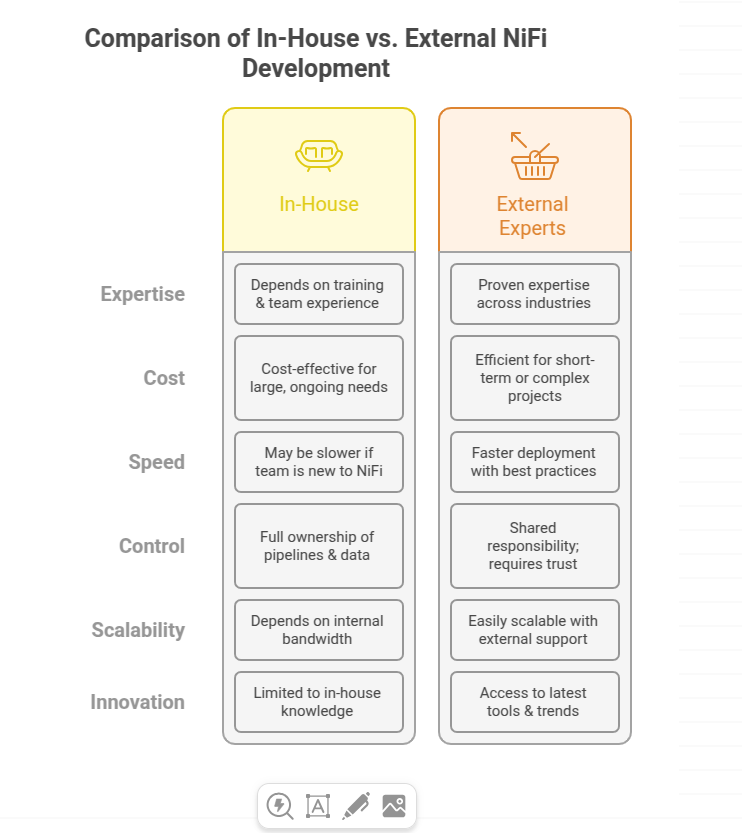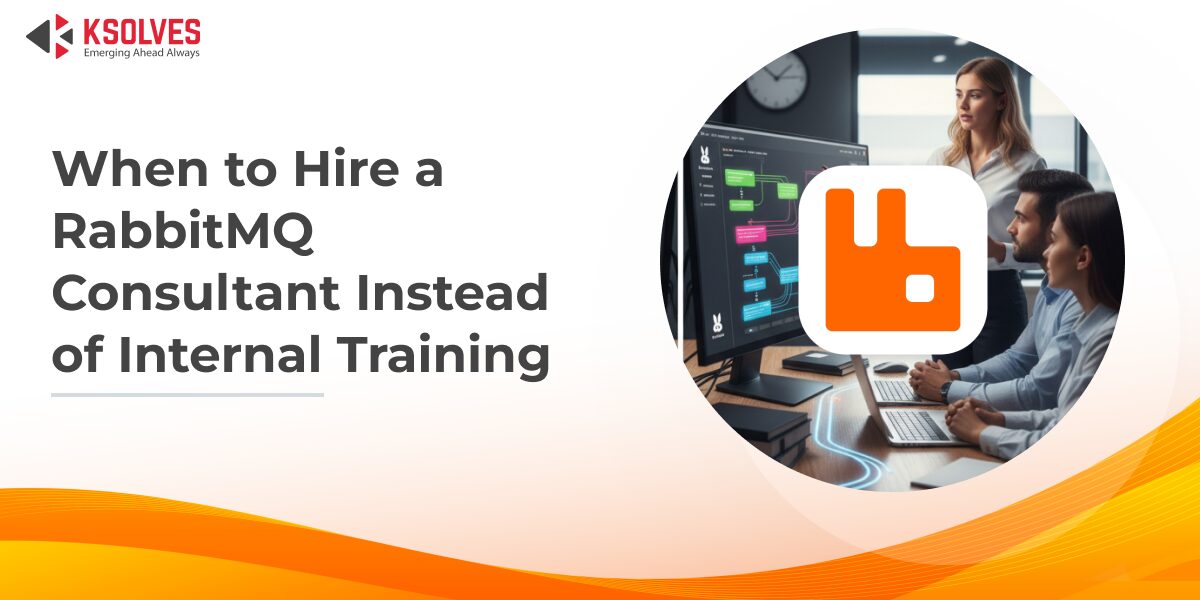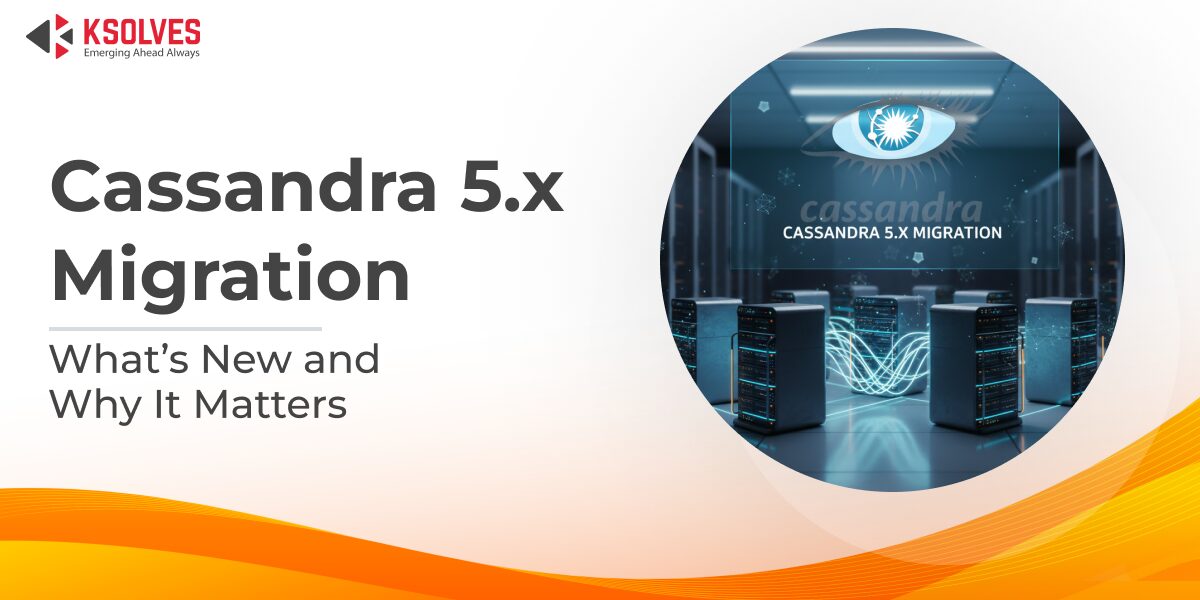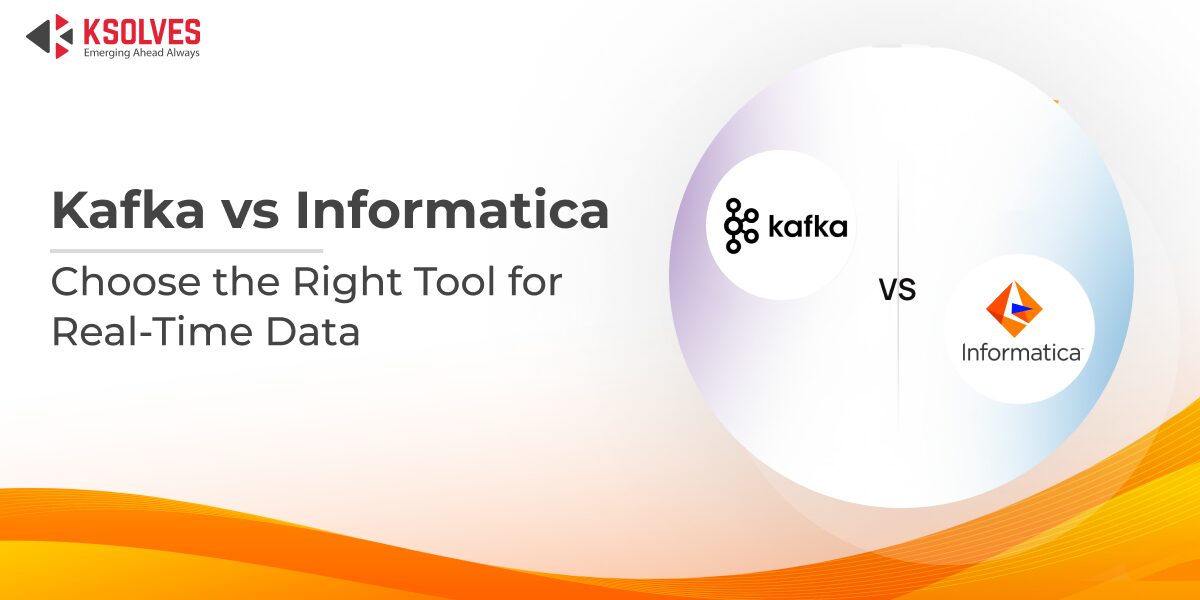When to Choose External NiFi Experts over In-House Development
Big Data
5 MIN READ
November 5, 2025
![]()

Every growing business eventually faces a pivotal decision: should you build capabilities in-house or outsource them to external partners? From IT development and customer support to marketing and operations, this question is not only about cost but also about long-term strategy, scalability, and control.
Choosing between in-house and outsourcing is not a one-size-fits-all answer. The right decision depends on your company’s goals, culture, budget, and timeline. While in-house offers control and cultural alignment, outsourcing brings speed, expertise, and cost flexibility. In this article, we’ll dive deep into the advantages and disadvantages of each, explore hybrid approaches, and provide practical guidelines to help you make the right choice for your organization.
What Do We Mean by In-House vs. Outsourcing?
In-House Development
In-house means everything is handled internally by employees who are on your company’s payroll. For example, a company with its own software engineers, HR managers, and marketing staff is running those functions in-house. It offers better control and cultural alignment but requires significant investment in people and infrastructure.
Outsourcing To Experts
Outsourcing is when you contract an external partner to carry out specific tasks or entire functions. For instance, a startup may outsource app development to a software agency in another country, or a multinational may outsource customer support to a call center. Outsourcing often reduces cost and provides quick access to specialized expertise, but it also brings challenges in quality management and control.
In-House NiFi Development: When It’s the Right Choice
Building and managing NiFi pipelines internally gives organizations a high level of control and ownership. Here’s when this approach makes the most sense:
Full Control and Alignment
Having a dedicated internal team ensures complete control over the project’s direction, priorities, and pace. Managers can closely monitor progress, ensure deadlines are met, and make timely decisions. Direct access to the team also streamlines communication, speeding up approvals and changes.
Alignment with Company Culture
In-house developers are immersed in the company’s values and work environment. This familiarity allows them to create solutions that truly reflect the business goals and needs. Their understanding of internal processes ensures the software aligns seamlessly with the company’s objectives.
Seamless Communication
With the team working on-site, updates and feedback are exchanged quickly and efficiently. Direct interaction fosters smoother collaboration between developers and other departments, often accelerating project timelines and reducing misunderstandings.
Improved Security
An in-house team operates within the company’s secure infrastructure, keeping sensitive data and code protected. This setup allows for tighter control over security protocols and ensures compliance requirements are consistently met, minimizing the risk of external breaches.
Capability Building and Knowledge Retention
Internal teams accumulate domain knowledge over time, which strengthens the company’s intellectual capital. This expertise can be reused for future projects, creating long-term value beyond immediate deliverables.
Cons of In-House Development
High Costs
Maintaining an in-house development team comes with substantial expenses, including competitive salaries, employee benefits, ongoing training, office space, equipment, and software licenses. These costs make in-house development significantly more expensive than outsourcing alternatives.
Limited Talent Pool
Finding qualified specialists locally can be a major challenge. Companies may struggle to hire the right skills, and relocation or incentive packages for external talent further increase costs and can delay project timelines.
Lengthy Recruitment
The hiring process for in-house developers is often time-consuming, involving multiple interviews, skill assessments, and onboarding procedures. It can take several months before a new employee becomes fully productive and integrated into the team.
Team & Technology Gaps
Internal teams may lack expertise in certain technologies or project management practices. These gaps can lead to delays, lower-quality outputs, or failure to meet specific technical requirements essential for the project’s success.
Post-Project Challenges
Once a project is completed, maintaining a large internal team may no longer be necessary. This can lead to layoffs, underutilized employees, and extra costs, creating operational inefficiencies and financial burdens for the company.
When to Choose External NiFi Experts
Lack of In-House Expertise
Apache NiFi may look simple at first glance due to its drag-and-drop interface, but in reality, designing production-grade pipelines requires in-depth knowledge of flow architecture, error handling, and data governance. Inexperienced teams often create flows that work for a demo but fail at scale, causing data loss, bottlenecks, or downtime.
How experts help: External NiFi consultants bring battle-tested experience and proven frameworks to the table. They design dataflows that are scalable, secure, and easy to maintain from the very start, ensuring your pipelines grow seamlessly with business demands. By avoiding trial-and-error, they minimize the risk of costly rework and future bottlenecks.
Time-Sensitive Projects
Business-critical projects such as regulatory compliance, real-time analytics, or customer-facing apps often run on strict deadlines. Delays in data integration can stall entire initiatives. Training internal staff or building flows by trial-and-error could mean missing key launch windows.
How experts help: NiFi experts accelerate delivery by using pre-built templates, automation strategies, and performance-tuned designs. This allows organizations to meet deadlines without compromising on quality.
Complex Data Ecosystem
Modern enterprises rarely rely on a single data source. Data comes from databases, IoT sensors, cloud storage, APIs, message queues like Kafka, and real-time streaming platforms. Integrating such a wide variety of data formats and protocols requires advanced knowledge of NiFi processors, connectors, and custom scripting.
How experts help: External specialists design seamless end-to-end pipelines, ensuring data flows smoothly between systems. They also address transformation, enrichment, and error-handling challenges, which your internal team may not anticipate.
Enterprise-Grade Security & Compliance
For industries such as finance, healthcare, and government, data security and regulatory compliance are non-negotiable. Regulations like HIPAA, GDPR, etc., demand airtight safeguards to protect sensitive information. A single misstep, such as weak encryption, poorly configured access controls, or an inadequate audit trail, can result in heavy penalties, reputational damage, and loss of customer trust.
How experts help: Experienced NiFi professionals design pipelines with security-first architecture. They implement role-based access control, enforce TLS/SSL encryption, enable end-to-end data provenance, and configure detailed audit logging. Beyond just compliance, experts ensure your data flows remain secure, transparent, and resilient, giving regulators and stakeholders confidence in your system’s integrity.
Scaling & Performance Challenges
As businesses expand, the volume, velocity, and variety of data increase exponentially. A pipeline that comfortably manages a few thousand events per hour can quickly become overwhelmed when scaled to millions per second. Without proper optimization, NiFi clusters may suffer from lag, data loss, and soaring infrastructure costs.
How experts help: External NiFi consultants bring deep expertise in cluster tuning, load balancing, and performance optimization. They design and fine-tune architectures that are not only resilient but also capable of sustaining massive real-time workloads at scale, ensuring speed, reliability, and cost efficiency remain intact.
Migration & Modernization
Many organizations are moving away from legacy ETL tools like SSIS, Informatica, or Talend toward modern platforms such as Apache NiFi, driven by the need for greater flexibility, scalability, and cost efficiency. However, migration projects carry significant risks; data flows must be carefully re-engineered without disrupting ongoing business operations.
How experts help: NiFi specialists bring structured migration strategies to the table. They map legacy workflows to NiFi processors, rebuild complex transformations, and manage cutovers with minimal downtime. Beyond execution, they also guide businesses on hybrid and cloud-native adoption strategies, ensuring the new infrastructure is future-ready, resilient, and aligned with evolving data needs.
Cost Efficiency in the Long Run
Building and maintaining a full-time, in-house NiFi team can be a significant financial commitment. Recruitment, onboarding, salaries, and continuous training quickly add up, particularly if NiFi is not your organization’s core technology but just one component of a broader data ecosystem. For short- and medium-term projects, these investments may outweigh the actual benefits.
How experts help: External NiFi consultants offer flexible, on-demand expertise, allowing businesses to access the right skills only when needed. Instead of bearing the overhead of a permanent team, organizations can scale support up or down based on project requirements, making it a far more cost-effective and sustainable option in the long run.
Support & Maintenance
Launching a data pipeline is only half the journey; ongoing monitoring, troubleshooting, and updates are critical for keeping flows stable and reliable. Internal IT teams are often overloaded with multiple responsibilities, leaving little bandwidth for proactive NiFi maintenance.
How experts help: External partners offer 24/7 monitoring, automated alerts, patching, and upgrades, ensuring smooth operations. They also provide quick troubleshooting when issues arise, minimizing downtime and keeping business processes uninterrupted.
Finding the Middle Ground: The Hybrid Approach
A hybrid model combines the best of both worlds. External NiFi experts handle the initial setup, architecture, and critical pipelines, ensuring a solid foundation. Once stabilized, the internal team takes over daily operations, supported by structured knowledge transfer. This approach delivers the speed of expert implementation while building long-term in-house self-sufficiency.
Conclusion
Deciding between in-house development and external NiFi experts ultimately comes down to your organization’s priorities, existing skillsets, and project timelines. An in-house team works best when you have skilled resources, long-term maintenance needs, and strict governance requirements. External experts, on the other hand, are ideal when speed, complex architectures, or short-term execution is critical. Many organizations find that a hybrid model offers the perfect balance—leveraging external expertise for setup and optimization while building in-house capabilities for ongoing management.
At the end of the day, the right choice is the one that enables you to run secure, scalable, and reliable data pipelines that support business success. For enterprises looking for a trusted partner, Ksolves provides end-to-end Apache NiFi support services, including 24/7 monitoring, cluster optimization, and compliance-driven security, ensuring your data ecosystem is always resilient and future-ready.
![]()









AUTHOR
Big Data
Anil Kushwaha, Technology Head at Ksolves, is an expert in Big Data. With over 11 years at Ksolves, he has been pivotal in driving innovative, high-volume data solutions with technologies like Nifi, Cassandra, Spark, Hadoop, etc. Passionate about advancing tech, he ensures smooth data warehousing for client success through tailored, cutting-edge strategies.
Share with